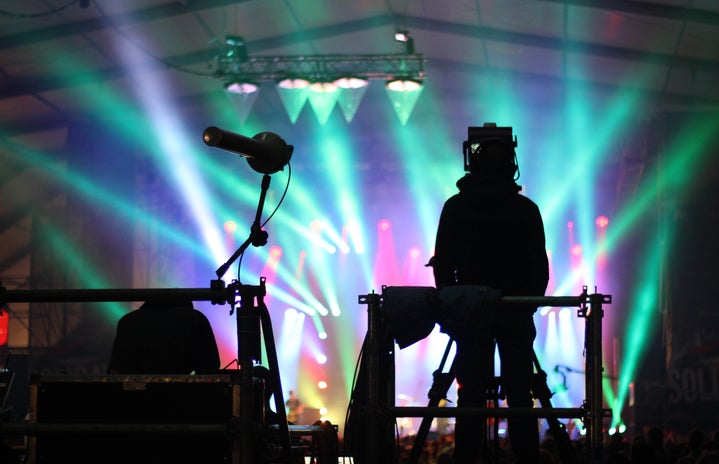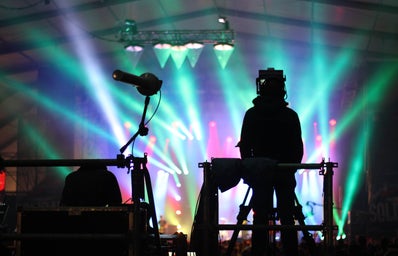How did you get started in music?
When I was 13, my friend asked me to DJ at her party and I remember getting the playlist together and mixing it all. I was too scared to perform live so I recorded my mix and played it at the party. From then onwards it all kicked off. I played at my lower school disco when I was in year 10, played at funeral parties, 50th’s…I earned loads of money playing at 13ths when I was in year 10 and 11. I just really enjoyed creating a new sound with already existing music that you would hear everyday in different kinds of contexts and mashing it up.
What are your main influences?
I really like 90s RnB vocals, as in big female vocals, 4/4 drum beats, grooves, etc. I remember being younger and my aspiration was to be Caribou. I became amazed that I realised you could sample all these amazing vocals and use them on the dance floor.
(Photo Credit: www.facebook.com)
There aren’t that many really successful female DJs. Who do you look up to?
There’s not many inspirations. The Black Madonna is a big influence. There’s B-Traits, I used to listen to her radio show on Radio 1. I remember seeing her at Lovebox when I was 16 and I was wowed. I’d never seen a woman own the stage the way that she did. She’s not your generic blonde Paris Hilton, she’s quirky and is proud.
Do you think she’s under more scrutiny because she’s a woman?
She’s definitely is. Female DJs all are. To be fair, credit to Annie Mac because she has launched so many female DJs into a male-dominated industry. I don’t really like her as a DJ but as a brand I think she’s great, and she’s been an absolutely great ambassador for women. Girls are always looked at more closely. Monki always wears sort of androgynous clothing and I wonder if that is trying to blend into this world. I think girls are under more scrutiny for their image. I like dressing up, when I play I always wear make-up. It is a performance thing.
(Photo Credit: www.facebook.com)
Do you know many other female DJs?
I only know one other girl that DJs and she doesn’t really DJ, she has a controller. There’s been a few occasions that I’ve been asked to give someone a mix just because I am a girl, which is amazing for me but a lot of the time I feel like it is not a novelty, people just think I am not as good technically because girls can’t be technical. I feel I’m sometimes overlooked because of my gender. There’s only one girl in DJ soc. It’s hard when you are in a position when you don’t have many resources or power. I would love to have a MoreThan female DJ night but I don’t know enough female DJs for that to happen.
(Photo Credit: www.facebook.com)
What resources are out there for women looking to start Djing?
There’s this label called Saffron Records which is an all-female record label based in Bristol. They started it up after being involved in a youth label where all the male artists were going off and doing other things and the girls were getting left behind. They wanted to do something exclusively for women. They run a programme at Small Horse Inn on how to DJ. It’s nice to have an all female space to learn. I think Small Horse is really good venue for female representation. Sometimes I feel judged when I’m practising in front of boys. It’s just being the minority; you feel like there is more scrutiny on you. It’s usually a male DJ and a female vocalist. It’s never the other way around. If it’s a male vocalist they’ll just be repeating sex-sex-sex to a 120 house beat.
Do you think we are moving towards a greater gender equality within the industry?
I think it is progressively changing – you’ve got young female DJs like Amy Becker now. But the only time there has been a female headliner in Bristol it’s been Nina Kraviz. Nina Kraviz and Ida Engberg, although successful female DJ’s, are often spoken about in relation to their male DJ partners. I think the problem is that some girls don’t realise that DJing is an option, they don’t think it is something they’re able to do. It’s because its so male-dominated. Girls aren’t expected to want to or be able to do it. Whenever I go and set up, every male technician (it’s always male), is very very surprised that I can put in my own cables! But if you like music and you like playing it then you take up an instrument, DJing is just another instrument.
Luma is the co-founder of ‘More Than’. Their next night will be on Wednesday 1st Feb at Cosies. Check out their facebook page.
(Photo Credit: www.facebook.com)


